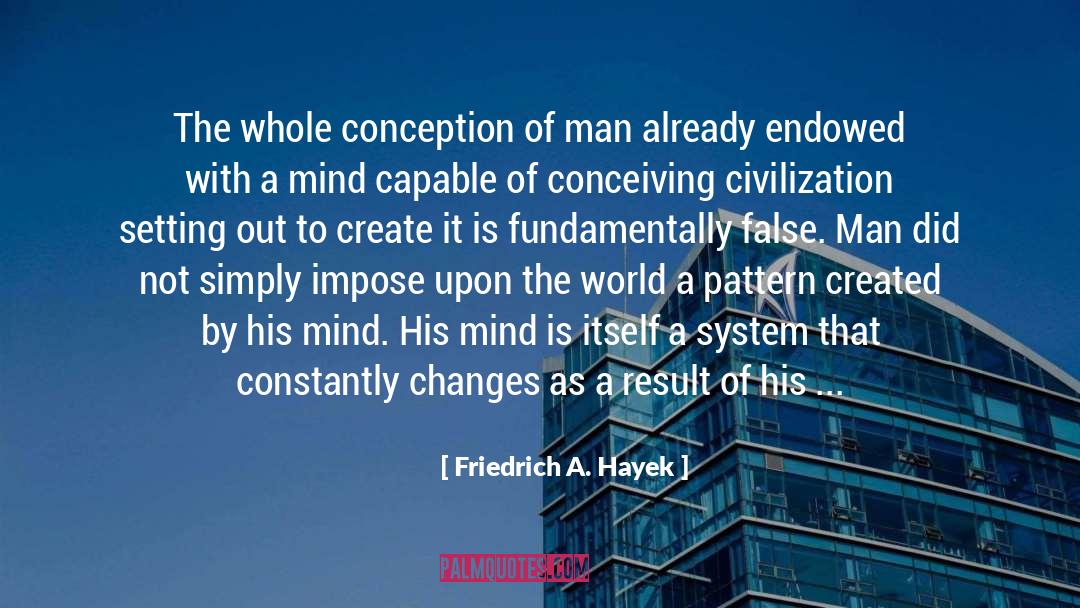Friedrich A. Hayek Famous Quotes
Reading Friedrich A. Hayek quotes, download and share images of famous quotes by Friedrich A. Hayek. Righ click to see or save pictures of Friedrich A. Hayek quotes that you can use as your wallpaper for free.
As long term institutions, I am totally against dictatorships. But a dictatorship may be a necessary system for a transitional period. [...] Personally I prefer a liberal dictator to democratic government lacking liberalism. My personal impression – and this is valid for South America – is that in Chile, for example, we will witness a transition from a dictatorial government to a liberal government.

Our necessary ignorance of so much means that we have to deal largely with probabilities and chances

The very conception of such a completion of the task of science is a contradction in terms. The quest of science is, therefore, by its nature a never-ending task in which every step ahead with necessity creates new problems.

What has made men good is neither nature nor reason but tradition.

This entails certain corollaries on which true individualism once more stands in sharp opposition to the false individualism of the rationalistic type. The first is that the deliberately organized state on the one side, and the individual on the other, far from being regarded as the only realities, which all the intermediate formations and associations are to be deliberately suppressed, as was the aim of the French Revolution, the noncompulsory conventions of social intercourse are considered as essential factors in preserving the orderly working in human society. The second is that the individual, in participating in the social processes, must be ready and willing to adjust himself to changes and to submit to conventions which are not the result of intelligent design, whose justification in the particular instance may be recognizable, and which to him will often appear unintelligible and irrational. I need not say much on the first point. That true individualism affirms the value of the family and all the common efforts of the small community and group, that it believes in local autonomy and voluntary associations, and that indeed its case rests largely on the contention that much for which the coercive action of the state is usually invoked can be done better by voluntary collaboration need not be stressed further. There can be no greater contrast to this than the false individualism which wants to dissolve all these smaller groups into atoms which have no cohesion other th

If all had to wait for better things until they could be provided for all, that day would in many instances never come. Even the poorest today owe their relative material well-being to the results of past inequality.

If we can agree that the economic problem of society is mainly one of rapid adaptation to changes in the particular circumstances of time and place, it would seem to follow that the ultimate decisions must be left to the people who are familiar with these circumstances, who know directly of the relevant changes and of the resources immediately available to meet them.

The whole conception of man already endowed with a mind capable of conceiving civilization setting out to create it is fundamentally false. Man did not simply impose upon the world a pattern created by his mind. His mind is itself a system that constantly changes as a result of his endeavor to adapt himself to his surroundings. It would be an error to believe that, to achieve a higher civilization, we have merely to put into effect the ideas now guiding us. If we are to advance, we must leave room for a continuous revision of our present conceptions and ideals which will be necessitated by further experience. We are as little able to conceive what civilization will be, or can be, five hundred or even fifty years hence as our medieval forefathers or even our grandparents were able to foresee our manner of life today.

What I have described as the liberal position shares with conservatism a distrust of reason to the extent that the liberal is very much aware that we do not know all the answers and that he is not sure that the answers he has are certainly the rights ones or even that we can find all the answers. He also does not disdain to seek assistance from whatever non-rational institutions or habits have proved their worth. The liberal differs from the conservative in his willingness to face this ignorance and to admit how little we know, without claiming the authority of supernatural forces of knowledge where his reason fails him. It has to be admitted that in some respects the liberal is fundamentally a skeptic - but it seems to require a certain degree of diffidence to let others seek their happiness in their own fashion and to adhere consistently to that tolerance which is an essential characteristic of liberalism.

Morals, including especially, our institutions of property, freedom and justice, are not a creation of man's reason but a distinct second endowment conferred on him by cultural evolution - runs counter to the main intellectual outlook of the twentieth century. The influence of rationalism has indeed been so profound and pervasive that, in general, the more intelligent an educated person is, the more likely he or she now is not only to be a rationalist, but also to hold socialist views (regardless of whether he or she is sufficiently doctrinal to attach to his or her views any label, including 'socialist'). The higher we climb up the ladder of intelligence, the more we talk with intellectuals, the more likely we are to encounter socialist convictions. Rationalists tend to be intelligent and intellectual; and intelligent intellectuals tend to be socialist.
One's initial surprise at finding that intelligent people tend to be socialist diminishes when one realises that, of course, intelligent people will tend to overvalue intelligence, and to suppose that we must owe all the advantages and opportunities that our civilisation offers to deliberate design rather than to following traditional rules, and likewise to suppose that we can, by exercising our reason, eliminate any remaining undesired features by still more intelligence reflection, and still more appropriate design and 'rational coordination' of our undertakings. This leads one to be favorably disposed to the central e

It is often contended that the belief that a person is solely responsible for his own fate is held only by the successful. This in itself is not so unacceptable as its underlying suggestion, which is that people hold this belief because they have been successful. I, for one, am inclined to think that the connection is the other way round and that people often are successful because they hold this belief. Though a man's conviction that all he achieves is due solely to his exertions, skill, and intelligence may be largely false, it is apt to have the most benefi cial effects on his energy and circumspection. And if the smug pride of the successful is often intolerable and offensive, the belief that success depends wholly on him is probably the pragmatically most effective incentive to successful action; whereas the more a man indulges in the propensity to blame others or circumstances for his failures, the more disgruntled and ineffective he tends to become.

So far as I personally am concerned I had better state that I feel as little entitled to assert as to deny the existence of what others call God, for I must admit that I just do not know what this word is supposed to mean. I certainly reject every anthropomorphic, personal or animistic interpretation of the term, interpretations through which many people succeed in giving it a meaning. The conception of a man-like or mind-like acting being appears to me rather the product of an arrogant overestimation of the capacities of a man-like mind. [...]
I long hesitated whether to insert this personal note here, but ultimately decided to do so because support by a professed agnostic may help religious people more unhesitatingly to pursue that conclusions that we do share. Perhaps what many people mean in speaking of God is just a personification of that tradition of morals or values that keeps their community alive.

It may be admitted that, as far as scientific knowledge is concerned, a body of suitably chosen experts may be in the best position to command all the best knowledge available - though this is of course merely shifting the difficulty to the problem of selecting the experts. What I wish to point out is that, even assuming that this problem can be readily solved, it is only a small part of the wider problem.
Today it is almost heresy to suggest that scientific knowledge is not the sum of all knowledge. But a little reflection will show that there is beyond question a body of very important but unorganized knowledge which cannot possibly be called scientific in the sense of knowledge of general rules: the knowledge of the particular circumstances of time and place. It is with respect to this that practically every individual has some advantage over all others because he possesses unique information of which beneficial use might be made, but of which use can be made only if the decisions depending on it are left to him or are made with his active cooperation.

Not Locke, nor Hume, nor Smith, nor Burke, could ever have argued, as Bentham did, that "every law is an evil for every law is an infraction of liberty." Their argument was never a complete laissez faire argument, which, as the very words show, is also part of the French rationalist tradition and in its literal sense was never defended by any of the English classical economists. They knew better than most of their later critics that it was not some sort of magic but the evolution of "well-constructed institutions," where the "rules and principles of contending interests and compromised advantages" would be reconciled, that had successfully channeled individual efforts to socially beneficial aims. In fact, their argument was never antistate as such, or anarchistic, which is the logical outcome of the laissez faire doctrine; it was an argument that accounted both for the proper functions of the state and for the limits of state action.

To produce the same result for different people, it is necessary to treat them differently. To give different people the same objective opportunities is not to give them the same subjective chance. It cannot be denied that the Rule of Law produces economic inequality - all that can be claimed for it is that this inequality is not designed to affect particular people in a particular way.

The man of system, on the contrary, is apt to be very wise in his own conceit; and is often so enamoured with the supposed
beauty of his own ideal plan of government, that he cannot suffer the smallest deviation from any part of it. He goes on to
establish it completely and in all its parts, without any regard either to the great interests, or to the strong prejudices which
may oppose it. He seems to imagine that he can arrange the different members of a great society with as much ease as the
hand arranges the different pieces upon a chess-board. He does not consider that the pieces upon the chess-board have no other
principle of motion besides that which the hand impresses upon them; but that, in the great chess-board of human society, every
single piece has a principle of motion of its own, altogether different from that which the legislature might chuse to impress
upon it. If those two principles coincide and act in the same direction, the game of human society will go on easily and
harmoniously, and is very likely to be happy and successful. If they are opposite or different, the game will go on miserably,
and the society must be at all times in the highest degree of disorder.

Fundamentally, in a system in which the knowledge of the relevant facts is dispersed among many people, prices can act to coordinate the separate actions of different people in the same way as subjective values help the individual to coördinate the parts of his plan.

